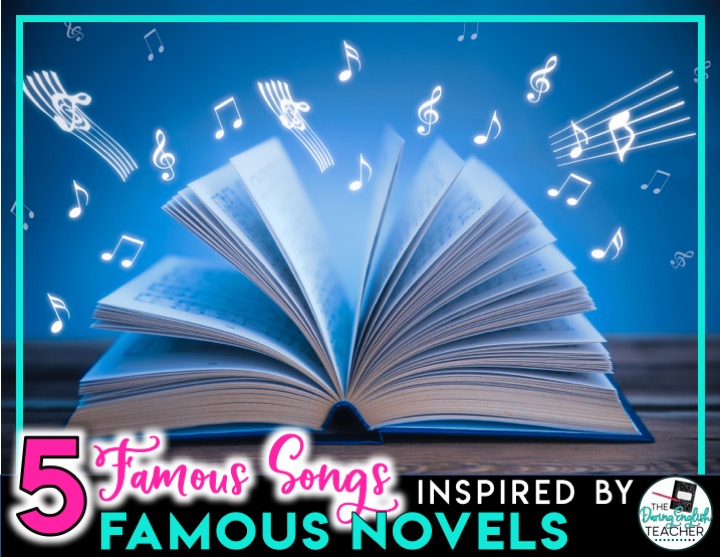While many people find beauty, inspiration, and even great fun in discussing the very same novels your students are learning for class, your students may find this very difficult to believe. They may not recognize the creativity and passion at work in classic novels, because in-class discussions usually take the form of a literary analysis essay.
To the young mind, an essay is not typically considered as the most passionate way to talk about any subject.
Show your students how invigorating literary analysis can be by introducing them to other mediums of discussion, like art or music.
Many literature fans have been so exhilarated by classic novels that they felt moved to write songs or even whole albums about them – resulting in some of the best-known hits of all time! Listening to these songs may help your students better grasp the incredible power of a good narrative arch or the compelling storytelling abilities often found in many beloved works.
Here are just a few examples of the many songs that have been inspired by literary classics. This post contains affiliate links.
Wuthering Heights, Kate Bush
Kate Bush’s debut single “Wuthering Heights” finds its inspiration in the classic novel of the same name, written by Emily Brontë. Bush sings from the point-of-view of ghostly heroine Catherine, calling out for her beloved Heathcliff from beyond the grave. Your students will be instantly besotted with Bush’s unique vocal trills and the swelling strings which contain all the whimsy and melancholia appropriate for Brontë’s tragic romance. An interesting facet of the song is how Bush plays with the motif of “coldness” as Brontë does when describing the rainy chill of Wuthering Heights’ location.
Literary lyrics: “Ooh, it gets dark, it gets lonely, on the other side from you. I pine a lot, I find the lot falls through without you. I’m coming back, love, cruel Heathcliff!
Big Brother, David Bowie
David Bowie was, evidently, so compelled by George Orwell’s 1984 that he wanted to mount a musical adaptation of it for the stage. However, after being denied the rights by Orwell’s estate, Bowie decided to include some of the numbers he had already written on his album Diamond Dogs instead. In the song Big Brother, Bowie’s lyrics encompass the insidious power that the propaganda figure held over Orwell’s imaginary dystopian society, as the citizens beg for Big Brother’s authority and guidance.
Literary lyrics: “Someone to claim us, someone to follow. Someone to shame us, some brave Apollo. Someone to fool us, someone like you.”
White Rabbit, Jefferson Airplane
“White Rabbit“, a song which certainly embodies Jefferson Airplane’s chosen genre psychedelic rock, contains several references to Lewis Caroll’s Alice’s Adventures in Wonderland and takes its title from one of its most iconic characters. White Rabbit plays with some of the colorful imagery from the book, and many read into the song as a long-form metaphor for the effects of hallucinogenic drugs. Others read White Rabbit as a protest song about the Vietnam War. Comparing and contrasting the supporting lyrical evidence for either interpretation could lead to a lively discussion suited for the most mature high school students!
Literary lyrics: “When the men on the chessboard get up and tell you where to go, and you’ve just had some kind of mushroom and your mind is moving low, go ask Alice.”
Shadows and Tall Trees, U2
U2’s “Shadows and Tall Trees” is named after chapter seven of William Golding’s Lord of the Flies, in which the boys on the island begin growing more and more crazed with violence and power. Discuss with your students how Shadows and Tall Trees, a song about boyhood struggles and questions of innocence, aligns with similar themes expressed in Lord of the Flies.
Literary lyrics: “Do you feel in me anything redeeming? Any worthwhile feeling? Is love like a tightrope hanging on my ceiling?”
Timshel, Mumford & Sons
Timshel is a Hebrew word meaning “thou mayest,” referenced in John Steinbeck’s East of Eden – Marcus Mumford’s favorite book. The entire song is an homage to a specific passage in the book in which one of the characters discusses how a person’s most significant power is their ability to choose between good and evil. The lyrics in “Timshul” play with this idea overarchingly but discuss other factors that contribute to a person’s goodness or lack thereof as well, such as connecting with other people and support from family. The song also features biblical imagery, which aligns with the themes in East of Eden.
Literary lyrics: “And you have your choices, and these are what make man great. His ladder to the stars.”




